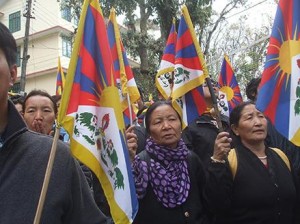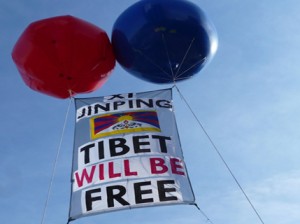March 10 will mark the 55th annual Tibetan Uprising Day. The tenth of March, known as Tibetan Uprising Day, commemorates the original rebellion and sacrifice of thousands of Tibetans, and signifies the ongoing struggle of the Tibetan cause. For modern Tibetans, this day symbolises the resistance and defiance of Tibet against accepting China’s crimes against humanity even in the face of severe threat and danger.
On March 10, 1959, a mass revolt took place in Lhasa, Tibet, where close to 300,000 Tibetans came together to protest against the illegal invasion of Tibet by the People’s Republic of China. China’s retaliation to the nationwide protest resulted in the deaths of around 87,000 Tibetans at the hands of the Chinese Army. This retaliation resulted in His Holiness the Dalai Lama’s exile to India, and since then, the people of Tibet have been subjected to a severe crackdown and countless ongoing human rights violations under the oppressive Chinese administration. The brutal policies administered under the Chinese regime have led to over 120 tragic self-immolations by Tibetans as a form of protest against China’s various human rights violations in Tibet.
In 2008, the peaceful protests and celebrations honouring the 49th Tibetan Uprising Day, came to be remembered as the 2008 Tibetan Unrest. This was the result of China’s belligerent response towards, and arrests of, numerous Tibetan protesters for allegedly engaging in “separatist activities.” China’s crackdowns since March 2008 have resulted in an estimated 227 known Tibetan deaths and over 6,810 Tibetan arrests.
March 10 this year will mark the 55th annual Tibetan Uprising Day. Since March 2012, this day is also known as Tibetan Martyr’s Day, and in Dharamshala, India the 54th anniversary of this day was commemorated with a valiant rendition of the Tibetan national anthem and a 60-second observation of silence in honour of the people who had sacrificed their lives for the Tibetan cause. Sikyong Lobsang Sangay stated in his speech, “The prohibitions of peaceful protest and harsh punishments compel Tibetans to resort to self-immolation. They choose death rather than silence and submission to the Chinese authorities.”
Tibetans all around the world annually observe the National Uprising Day by gathering together and ensuring that the voice of Tibet is renewed and is ultimately unforgotten, so that the efforts can continue towards putting an end to the ongoing human rights violations caused by China.





 Print
Print Email
Email